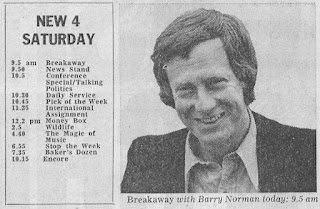On occasional forays back to the UK (when we “allez to Calais”) taking the autoroute north roadside signs encourage us tune in to Autoroute Info 107.7, a bilingual traffic news service. I was recently reminded that a similar service existed on the other side of la Manche when I came across this audio clip of Channel Travel Radio (an Audioboo posted by user 'belfastchild', now longer active):
Channel Travel Radio first aired on 107.6 FM in August 1995. But how did it work? I am indebted to broadcaster Ian McGregor, who helped set up the station, for this lowdown.
Channel Travel Radio was licensed as a long running RSL paid for by Eurotunnel and located in their control room. The broadcasters sat in a glass booth behind the controllers so we could see everything that was going on.
Eurotunnel sub-contracted the first licence to Capital Radio to run the station. It was live for eight hours a day (7-11 a.m. and 1-5 p.m.) and a loop tape (no real time information) the rest of the time. The shows were double-headed with a French speaking co-host.
The late Gavin Lawrence set it up, Capital sub-contracted the day-to-day running of the station to him. I helped him devise the format and we practised it together one Easter Sunday afternoon, making tweaks as we went along, but it was his gig, he was our boss and answerable directly to Capital.
Capital's format was very upbeat, everything had a music bed and I recall we had drop ins from Dr Fox and Alan Freeman. I remember one sunny day playing Mungo Jerry's In the Summertime (for we had free reign on the playlist) and the big boss from Capital, who happened to heading down the M20 for a meeting with us at the time, said to me afterwards he was fine about the song but would prefer I played the Shaggy version, so they wanted very contemporary. Eurotunnel wanted a toned down format and eventually gave the contract to Radio Services Limited, who made it “more Radio 4” with music, and very toned down music at that including a lot of classical. Eurotunnel managed to run it live 24/7. The presenters worked longer shifts and pre-recorded carts were used for the French announcements rather than a second presenter.
I recall there were two sets of 'partner' voices. Male presenters would get a female jingle voice and French announcer and female colleagues would have a male voice.
Although the Radio Services station had announcers on duty round the clock a lot of the output, i.e. weather forecasts, currency checks etc, was pre-recorded. The live links were mostly reserved for real time running information.
Unfortunately Ian’s whole audio archive was wiped last year but with the help of former colleague Michaela Segol here are a couple of clips of the Capital format station featuring both Michaela and Ian:
Courtesy of Simon Trevallion is this recording of the Radio Services incarnation:
Channel Travel Radio’s broadcast licence was revoked in September 2000 following Eurotunnel’s decision to pull the plug on further funding for the station. Ian continues:
The stumbling block was that the Radio Authority licence required the station to be impartial, so we had to give out ferry news as well - and of course the ferry operators weren't contributing to the station's running costs, which always stuck in Eurotunnel's craw. Having said that, the Eurotunnel exit from the M20 came before the ferry turn offs, so Eurotunnel was always gleeful when there was weather disruption as many ferry customers would make a quick decision to bail off the motorway early and take the shuttle exit. Eurotunnel eventually closed the station and handed the licence back to the Radio Authority.
The presenters on the Capital run Channel Travel Radio were:
Gavin Lawrence (BBC Radio Kent, BBC Essex, BBC London, Invicta, Arrow FM, Sovereign FM)
Ian McGregor (BBC Radio Kent, BBC Travel Centre, now running Just Talking Communications)
Julie Maddocks (also at Invicta FM, ITN News Channel, BBC Radio Kent and now BBC London)
Hosting the French side of things were:
Michaela Segol (who would become the station manager under Radio Services Ltd and then Programme Coordinator at KMFM)
Aurelie Claudel (previously in sales at Invicta)
Ann Marie Glasheen (a Belgian actress)
Pippa Sparkes (now with Metro Networks and BBC London travel)
On the station run by Radio Services Ltd (under Group MD Lisa Kerr) the station manager and presenter was Michaela Segol. The on air talent included:
Don Durbridge (more on Don here)
Simon Trevallion (on the Spanish based Ace FM and community station Digital Hits One)
Nathan Cooper (later at Mix 96 in Aylesbury and now Bucks Radio)
Richard Adams (went on to Neptune Radio then KMfm as regional programme controller and then Adams Media Services)
Richard Adams (went on to Neptune Radio then KMfm as regional programme controller and then Adams Media Services)
Steve Phillips (later with BBC London travel, then various media strategy/communications roles at RBS, Barclays and ITV)
Andy McColl (travel reporter and presenter for BBC and commercial stations, producer (Output Manager) at Traffic Radio and then LBC and XFM Manchester, now Project manger for iSAMS Ltd)
Bobbie Pryor (now with BBC Radio 2)
Romilly Paradine (formerly of Essex Radio/Breeze AM)
Brian Sims (later at Sovereign Radio in Eastbourne)
James Day (ex Voice of Peace and Caroline 558)
Richard Harding (BBC Radio Cambridgeshire, Hereward FM, Island FM in Guernsey and now reporter for South Hams Newspapers)
Jayne Constantinis (at the time a BBC TV continuity announcer)
Hayley Edmunds (former BBC Broadcast Assistant now Director of Learning for Humanities at the Marsh Academy in Kent)
Mark Carter (now on BBC Sussex and BBC Surrey)
This was the last of six summer posts on travel and transport.
My thanks go to Ian McGregor, Michaela Segol and Simon Trevallion.
[This post was updated in January 2023].







